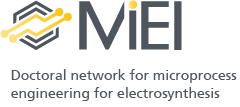MiEL’s 12 doctoral candidates will develop synthesis technology for the chemical industries of the 21st century by combining the advantages of electrochemistry, micro process engineering and flow-chemistry.
In theory, electrochemical technologies offer the highest energy efficiency in production, and microfluidics offer the highest safety and best process control in chemical processes. A combination of these two technologies is the logical step towards a more reliable, flexible, safe and sustainable chemical industry. Especially for the synthesis of fine chemicals or pharmaceuticals with relatively low output but specific chemistry – such as fluorination – this method offers advantages in production.
Three synthesis routes will be investigated:
1) two-phase electrosynthesis
2) aqueous electrosynthesis
3) non-aqueous electrosynthesis
These three reaction paths can be regarded as relevant model processes for the pharmaceutical/fine chemical industry. The ambitious research objective is to upscale these technologies using integrated cell concepts such as printed circuit board technology (PCB technology) with integrated process control, for in-situ optimized yield control. The cells can be assembled in synthesis arrays for the safe, flexible and sustainable synthesis of chemical products, which can also be used for catalytic screening. This approach will make it possible to find new synthetic routes for the sustainable chemical industry of the future.
MiEl’s network is embedded into a highly specialized modelling community, which develops models on different length scales, helping to simulate electrode structures with multi-phase flow of fluids, multi-electron step reactions, and electrochemical flow cells. A techno-economical investigation will provide guidance to all disciplines and ensure that the outcome of the project is to define the economic and ecological “sweet spot” in applied electrosynthesis.
Contact
Dr. Robin Kunkel (Project Coordinator)
+49 721 4640 504
Carolyn Fisher
+49 721 4640 277
Fraunhofer Institute for Chemical Technology
Joseph-von-Fraunhoferstraße 7
76327 Pfinztal (Berghausen), Germany
Funding

Funded by the European Union (Grant Agreement no. 101073003). Views and opinions expressed are however those of the author(s) only and do not necessarily reflect those of the European Union. Neither the European Union nor the granting authority can be held responsible for them.
Social media
LinkedIn: MiEl – Doctoral network for microprocess engineering for electrosynthesis
Twitter: project_MiEl
Data privacy information
Imprint and Disclaimer
